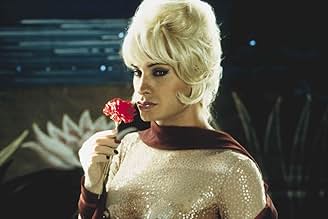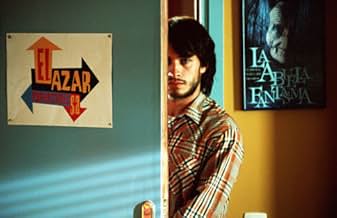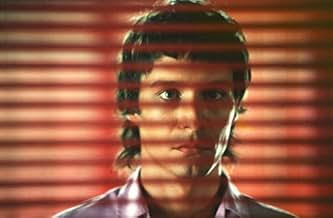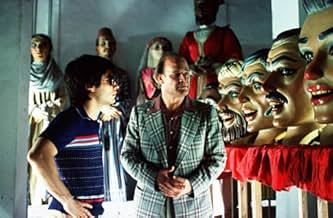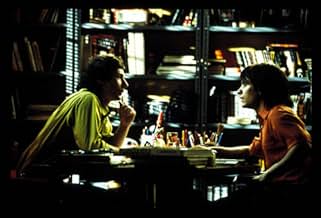CALIFICACIÓN DE IMDb
7.4/10
65 k
TU CALIFICACIÓN
Una mirada a los efectos que tuvieron las escuelas religiosas franquistas y sus abusos sexuales a través de los ojos de dos amigos de infancia.Una mirada a los efectos que tuvieron las escuelas religiosas franquistas y sus abusos sexuales a través de los ojos de dos amigos de infancia.Una mirada a los efectos que tuvieron las escuelas religiosas franquistas y sus abusos sexuales a través de los ojos de dos amigos de infancia.
- Nominada a1 premio BAFTA
- 16 premios ganados y 42 nominaciones en total
Nacho Pérez
- Ignacio
- (as Ignacio Pérez)
Raúl García Forneiro
- Enrique
- (as Raúl Gª Forneiro)
Agustín Almodóvar
- Limpiador Piscina
- (sin créditos)
Pedro Almodóvar
- Limpiador Piscina
- (sin créditos)
Robert Forcadell
- Man in public
- (sin créditos)
Luis Lobos Negros
- Motero ochentero
- (sin créditos)
- Dirección
- Guionista
- Todo el elenco y el equipo
- Producción, taquilla y más en IMDbPro
Opiniones destacadas
In "La Mala Educación", Almodóvar is very serious and too dark and tragic, when comparing to his previous movies. There are many usual elements, such as the attack to the Catholic Church, gays, travesties, homosexual intercourse, child abuse etc., but not in his common ironical, colorful and funny way; instead, the story is developed in a very bitter context. The screenplay magnificently discloses the plot, with a story inside another story, mixing "reality" with fiction; the direction of Pedro Almodóvar is excellent as usual; and Gael Garcia Bernal proves his versatility as an outstanding actor. Although being a great film, I do not dare to recommend "La Mala Educación" for any audiences. However, fans like me of this great Spanish director will certainly like it a lot. My vote is eight.
Title (Brazil): "Má Educação" ("Bad Education")
Title (Brazil): "Má Educação" ("Bad Education")
Is it an accusation of the Catholic Church or is it the story of a priest who is bound by his religion to strict rules concerning sex and feelings? Is there a theme in the film or is it just a story? Those are a couple of questions I asked myself after seeing La Mala Educación from the Spanish director Pedro Almodóvar.
Actually, La Mala Educación exists of three stories which have been interwoven in a miraculous way. Story one: film director Enrique is being paid a visit by a long lost friend. That friend, Ignacio, is an actor and has written a story that Enrique might want to make into a film. Enrique's story is for one part made up by Ignacio's and Enrique's experiences when they were young boys and were living in a Catholic boarding school. Ignacio reads the manuscript and sees the pictures in his head, and that is story two: a transvestite finds an old friend, Ignacio. After having sex, the transvestite steals a manuscript Ignacio wrote about his secret: while in boarding school he was sexually abused by a priest. To gain money, the transvestite blackmails the priest: give me money or I'll publish the manuscript. The priest reads parts of the manuscript. And that is the third story: the experiences of the real Enrique and the real Ignacio while attending boarding school. During that time they discovered the meaning of friendship, love and physical desires.
You have to keep up with the film. When your attention wanes you might miss a detail that's important later. When seeing the film, try to remember the names of the characters very quickly. It makes viewing easier.
Is La Mala Educación a typical Pedro Almodóvar film? Yes and no. No, since women are not the main theme, as in his other films. No, because it's not an unbelievable and absurdist story. Yes, since the film has some typical Almodóvar characteristics: the transvestite, the junkie that is caught on the lee shore, and the hope people have to reach a better life. More than in other Almodóvar films homosexuality is an important theme.
When the film was over you could see the visitors of the cinema thinking: is it a film about the Catholic Church, about emotions and selfishness, about The scenes had to fall in place.
Actually, La Mala Educación exists of three stories which have been interwoven in a miraculous way. Story one: film director Enrique is being paid a visit by a long lost friend. That friend, Ignacio, is an actor and has written a story that Enrique might want to make into a film. Enrique's story is for one part made up by Ignacio's and Enrique's experiences when they were young boys and were living in a Catholic boarding school. Ignacio reads the manuscript and sees the pictures in his head, and that is story two: a transvestite finds an old friend, Ignacio. After having sex, the transvestite steals a manuscript Ignacio wrote about his secret: while in boarding school he was sexually abused by a priest. To gain money, the transvestite blackmails the priest: give me money or I'll publish the manuscript. The priest reads parts of the manuscript. And that is the third story: the experiences of the real Enrique and the real Ignacio while attending boarding school. During that time they discovered the meaning of friendship, love and physical desires.
You have to keep up with the film. When your attention wanes you might miss a detail that's important later. When seeing the film, try to remember the names of the characters very quickly. It makes viewing easier.
Is La Mala Educación a typical Pedro Almodóvar film? Yes and no. No, since women are not the main theme, as in his other films. No, because it's not an unbelievable and absurdist story. Yes, since the film has some typical Almodóvar characteristics: the transvestite, the junkie that is caught on the lee shore, and the hope people have to reach a better life. More than in other Almodóvar films homosexuality is an important theme.
When the film was over you could see the visitors of the cinema thinking: is it a film about the Catholic Church, about emotions and selfishness, about The scenes had to fall in place.
This is a difficult film to write about. For one thing, to describe the plot would be to give away the twists and thus spoil its surprises; but for another, it's impossible to take a great work of art and put it into words. That said, here goes:
Truth be told, it was the promise of Gael Garcia Bernal (whom I've loved since "Y Tu Mama Tambien") in drag that piqued my interest in seeing "Bad Education." The only other Almodovar movie I'd seen before this was "Talk to Her," which I was on the fence about, but if Gael Garcia Bernal was involved, I was happy to give Almodovar another shot. (Interestingly, "Bad Education" has given me a new appreciation of "Talk to Her." The two films share a lot of themes -- false identity and self-creation, the willful self-deception and fantasy of falling in love, the spiritualization of aesthetic beauty -- not to mention a hypnotic use of music, an indifferent attitude towards women, and a few actors I recognized.)
Almodovar's genius in both "Bad Education" and "Talk to Her" is his ability to set the scene, stringing the audience along, lulling it into a sense of comprehension and security, and then suddenly turning the tables with a twist of such dizzying magnitude that the mind, reeling, forced to give up on trying to understand, must just relax and allow the movie to take over -- miraculously, all without leaving the audience feeling manipulated. In "Bad Education," he takes this device to breathless, upper-atmospherical levels, for with each twist, the film takes on a new genre.
It begins as a tender coming-of-age story, interspersed with boarding-school flashbacks reminiscent of such French fare as Louis Malle's "Au revoir, les enfants" and François Truffaut's "L'argent de pôche," although I sensed a lot of Fellini in the mod outfits, feathery hairstyles, and picturesque bicycle-strewn streets. Probably the most romantic segment of the film, it alludes even to "Breakfast at Tiffany's" (Henry Mancini's "Moon River" hasn't been employed so creatively since last year's "Angels in America"). Indeed, the performances are so endearing, the cinematography so warm and luminous, that this segment of "Bad Education" could easily exist as its own self-contained movie. I was fully prepared to embrace it and love it as a sincere period romance.
But without warning, the film turns itself upside down and becomes an exhilarating meta-commentary in the vein of Charlie Kaufman's "Adaptation" (complete with crocodiles). Romance turns to farce and tragedy to comedy as the self-consciously cinematic style gives way to the silliness of a movie-within-a-movie.
Unlike "Adaptation," though, "Bad Education" goes on, and in this way it retains its heart and soul. Further twists are introduced, and the movie metamorphoses into a mystery, a thriller, a dark rain-soaked noir -- by the end, I felt as though I had just lived through a hundred years of cinema history, all condensed into less than two rich, glorious hours.
So what holds it all together? The answer is Gael Garcia Bernal. He is a true movie star -- divinely beautiful, dazzlingly charismatic, with that all-important aura of mystery -- and though he virtually plays five characters as his character transforms along with the film, his strikingly calm blue-green eyes and sensual mouth provide a steady center for the madness around him. Despite the rumors of his abusive treatment on set at the hands of Almodovar, Garcia Bernal has a dignity (without which "Bad Education" would collapse under the weight of its own intelligence) that no amount of makeup, wigs, dresses, induced anorexia, or fake Spanish lisping can mask.
"Bad Education" was one of the most intense movie-going experiences I've ever had, and if its future doesn't hold critical acclaim and recognition as a classic, then there's no justice in the world.
Truth be told, it was the promise of Gael Garcia Bernal (whom I've loved since "Y Tu Mama Tambien") in drag that piqued my interest in seeing "Bad Education." The only other Almodovar movie I'd seen before this was "Talk to Her," which I was on the fence about, but if Gael Garcia Bernal was involved, I was happy to give Almodovar another shot. (Interestingly, "Bad Education" has given me a new appreciation of "Talk to Her." The two films share a lot of themes -- false identity and self-creation, the willful self-deception and fantasy of falling in love, the spiritualization of aesthetic beauty -- not to mention a hypnotic use of music, an indifferent attitude towards women, and a few actors I recognized.)
Almodovar's genius in both "Bad Education" and "Talk to Her" is his ability to set the scene, stringing the audience along, lulling it into a sense of comprehension and security, and then suddenly turning the tables with a twist of such dizzying magnitude that the mind, reeling, forced to give up on trying to understand, must just relax and allow the movie to take over -- miraculously, all without leaving the audience feeling manipulated. In "Bad Education," he takes this device to breathless, upper-atmospherical levels, for with each twist, the film takes on a new genre.
It begins as a tender coming-of-age story, interspersed with boarding-school flashbacks reminiscent of such French fare as Louis Malle's "Au revoir, les enfants" and François Truffaut's "L'argent de pôche," although I sensed a lot of Fellini in the mod outfits, feathery hairstyles, and picturesque bicycle-strewn streets. Probably the most romantic segment of the film, it alludes even to "Breakfast at Tiffany's" (Henry Mancini's "Moon River" hasn't been employed so creatively since last year's "Angels in America"). Indeed, the performances are so endearing, the cinematography so warm and luminous, that this segment of "Bad Education" could easily exist as its own self-contained movie. I was fully prepared to embrace it and love it as a sincere period romance.
But without warning, the film turns itself upside down and becomes an exhilarating meta-commentary in the vein of Charlie Kaufman's "Adaptation" (complete with crocodiles). Romance turns to farce and tragedy to comedy as the self-consciously cinematic style gives way to the silliness of a movie-within-a-movie.
Unlike "Adaptation," though, "Bad Education" goes on, and in this way it retains its heart and soul. Further twists are introduced, and the movie metamorphoses into a mystery, a thriller, a dark rain-soaked noir -- by the end, I felt as though I had just lived through a hundred years of cinema history, all condensed into less than two rich, glorious hours.
So what holds it all together? The answer is Gael Garcia Bernal. He is a true movie star -- divinely beautiful, dazzlingly charismatic, with that all-important aura of mystery -- and though he virtually plays five characters as his character transforms along with the film, his strikingly calm blue-green eyes and sensual mouth provide a steady center for the madness around him. Despite the rumors of his abusive treatment on set at the hands of Almodovar, Garcia Bernal has a dignity (without which "Bad Education" would collapse under the weight of its own intelligence) that no amount of makeup, wigs, dresses, induced anorexia, or fake Spanish lisping can mask.
"Bad Education" was one of the most intense movie-going experiences I've ever had, and if its future doesn't hold critical acclaim and recognition as a classic, then there's no justice in the world.
Almodovar's latest film is a tantalizing, hypnotic and sexy mixture of VERTIGO, MEMENTO and MULLHOLLAND DRIVE. It's Almodovar's meatiest and most complex script in years. Although you may be confused early on as you're trying to figure out whats going on, its all revealed later and very satisfyingly. Gael Garcia Bernal is outstanding in his multi-dimensional, multi-character performance. Alberto Iglesia's music is wonderful--a homage to Bernard Herrmann.
The film is rated NC-17, which has more to do with the MPAA Board's homophobia than anything else. Sure, its a sexy drama with elements adult plotpoints, but had the sex scenes in this film been between a man and a woman, rather than two men, this would have easily gotten an R rating. All of the sex scenes are artfully filmed (there is no frontal nudity) and even the subplot concerning a pedophile priest is handled with care.
The film is rated NC-17, which has more to do with the MPAA Board's homophobia than anything else. Sure, its a sexy drama with elements adult plotpoints, but had the sex scenes in this film been between a man and a woman, rather than two men, this would have easily gotten an R rating. All of the sex scenes are artfully filmed (there is no frontal nudity) and even the subplot concerning a pedophile priest is handled with care.
It is a very good film, although not as absolutely great as "Todo sobre my madre" and "Hable con ella"... Maybe because "Mala education" is sadder and darker than the previous Almodòvar films, the theme (the child abuse during college years) is disturbing and depressing, of course.
Almodòvar chooses this time a "noir" story. Enrique, a young movie director, looks for ideas for his next film. By chance he meets Ignacio, an old fellow of the college and his first love. Ignacio gives him a tale written by him, about the sexual abuses on him made by a priest during his childhood, in the college. This will be the inspiration for Enrique's movie, but the director will discover another dramatic truth...
In this film the gay element -which exists in all the Almodòvar's movies- comes back, stronger than in his last films. But above all there's the child rape problem, this is one of the most delicate themes the Spanish director has ever talked about. And naturally "Mala educacion" is one of his most tragic films. Whereas in the previous movies Almodòvar always let a place for hope, with this film it's not the case. That's why it is a very difficult tale to watch.
Cinematography is excellent, the music as well (with many recalls to the Sixties songs). Actors are also very good. For Gael Garcia Bernal (we saw him recently in "Motorcycle diaries") this is another solid effort. He portrays Ignacio, he enters the Almodòvar world with all the ambiguity required.
Almodòvar chooses this time a "noir" story. Enrique, a young movie director, looks for ideas for his next film. By chance he meets Ignacio, an old fellow of the college and his first love. Ignacio gives him a tale written by him, about the sexual abuses on him made by a priest during his childhood, in the college. This will be the inspiration for Enrique's movie, but the director will discover another dramatic truth...
In this film the gay element -which exists in all the Almodòvar's movies- comes back, stronger than in his last films. But above all there's the child rape problem, this is one of the most delicate themes the Spanish director has ever talked about. And naturally "Mala educacion" is one of his most tragic films. Whereas in the previous movies Almodòvar always let a place for hope, with this film it's not the case. That's why it is a very difficult tale to watch.
Cinematography is excellent, the music as well (with many recalls to the Sixties songs). Actors are also very good. For Gael Garcia Bernal (we saw him recently in "Motorcycle diaries") this is another solid effort. He portrays Ignacio, he enters the Almodòvar world with all the ambiguity required.
¿Sabías que…?
- TriviaGael García Bernal fired off an angry riposte to New York Times reporter Lynn Hirschberg after she claimed that he had fallen out with Pedro Almodóvar over filming the explicit homosexual love scenes in the film. Bernal wanted it on record that he had had absolutely no reservations about taking the role.
- ErroresWhen Burenguer declines Ignacio's story over the phone, he says that he wouldn't be accepting it for "Short Stories of the 80's." According to his story, it would have had to been at least 1977, three years before the 1980s, let alone before a compilation of stories from the 1980s would be released.
- Versiones alternativasAn R-rated version of the film that trims or cuts some scenes was released on DVD, though the original NC-17 one is also available in the exact same format.
- Bandas sonorasQuizás, Quizás, Quizás
Written by Osvaldo Farrés
Published by Peer International Corporation (BMI)
(c) 1947 by Caribbean Music Co. Ltd
Performed by Sara Montiel
By the license from Dpto. de Productos Especiales de (p) EMI Odeon, S.A., Madrid, España, 2003
Selecciones populares
Inicia sesión para calificar y agrega a la lista de videos para obtener recomendaciones personalizadas
- How long is Bad Education?Con tecnología de Alexa
Detalles
- Fecha de lanzamiento
- Países de origen
- Sitio oficial
- Idiomas
- También se conoce como
- Bad Education
- Locaciones de filmación
- Productoras
- Ver más créditos de la compañía en IMDbPro
Taquilla
- Presupuesto
- USD 5,000,000 (estimado)
- Total en EE. UU. y Canadá
- USD 5,284,284
- Fin de semana de estreno en EE. UU. y Canadá
- USD 147,370
- 21 nov 2004
- Total a nivel mundial
- USD 40,432,275
- Tiempo de ejecución
- 1h 46min(106 min)
- Mezcla de sonido
- Relación de aspecto
- 2.35 : 1
Contribuir a esta página
Sugiere una edición o agrega el contenido que falta

